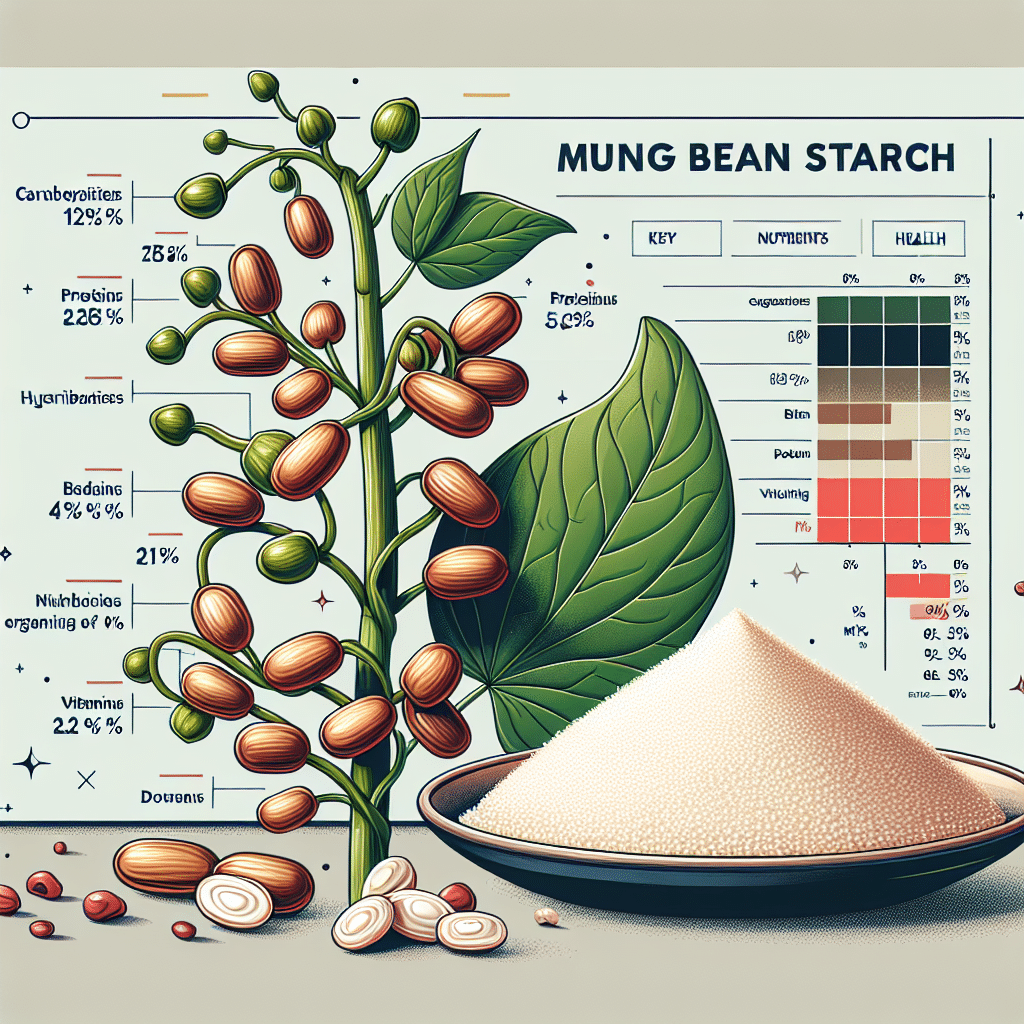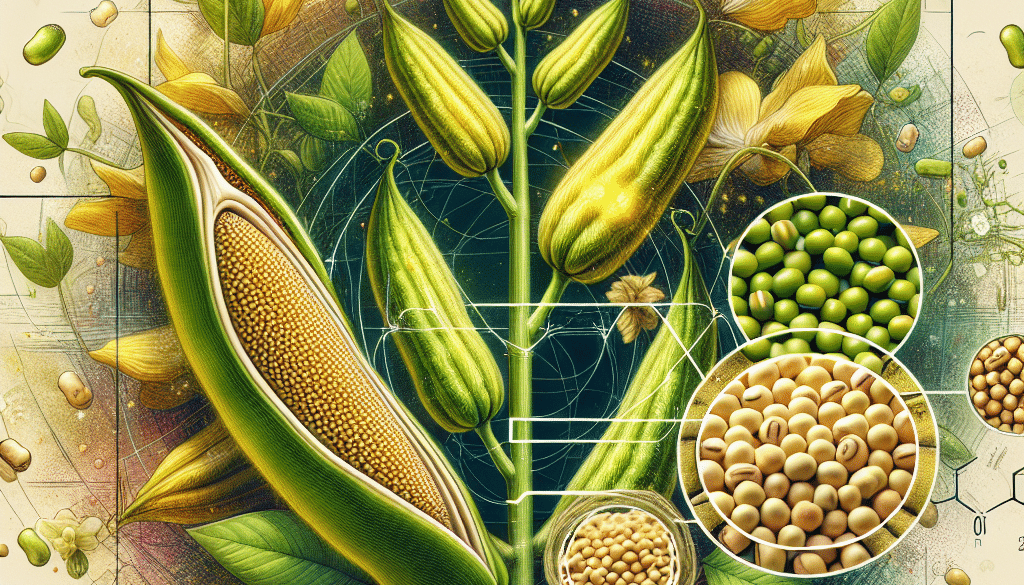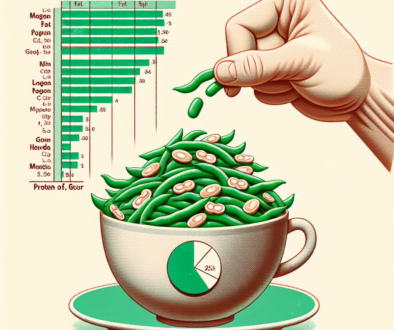Nutritional Insights into Mung Bean Starch
-
Table of Contents
- Mung Bean Starch: A Nutritional Goldmine and Its Versatile Applications
- Understanding Mung Bean Starch
- Nutritional Profile of Mung Bean Starch
- Health Benefits of Mung Bean Starch
- Culinary Uses of Mung Bean Starch
- Case Studies and Statistics
- Conclusion: The Nutritional Power of Mung Bean Starch
- Discover ETprotein’s High-Quality Protein Products
Mung Bean Starch: A Nutritional Goldmine and Its Versatile Applications

Mung bean starch, derived from the leguminous plant Vigna radiata, is a fine, powdery substance that has been a staple in Asian cuisine for centuries. Its unique properties and health benefits have sparked interest in the global food industry, leading to its incorporation into a variety of products. This article delves into the nutritional profile of mung bean starch, its health implications, and its versatile uses in the culinary world.
Understanding Mung Bean Starch
Mung bean starch is extracted from mung beans, which are small, green legumes that are a rich source of protein, fiber, and nutrients. The starch is obtained by soaking, grinding, and filtering the beans to separate the starch granules from the protein and fiber. The result is a gluten-free, hypoallergenic starch that is highly digestible and has a neutral taste, making it an excellent thickening agent and ingredient for those with dietary restrictions.
Nutritional Profile of Mung Bean Starch
The nutritional value of mung bean starch is noteworthy, as it is low in calories and contains no cholesterol. It is primarily composed of carbohydrates, with a small amount of protein and negligible fat content. The starch is also a good source of resistant starch, which acts as a prebiotic, feeding beneficial gut bacteria and promoting digestive health.
- Carbohydrates: Mung bean starch is rich in complex carbohydrates, providing a steady source of energy.
- Protein: Although the protein content is low, it is still present and contributes to the overall nutritional value.
- Fiber: The resistant starch in mung bean starch acts as dietary fiber, aiding in digestion and bowel regularity.
- Minerals: Mung bean starch contains trace amounts of minerals such as potassium and magnesium.
Health Benefits of Mung Bean Starch
The health benefits of mung bean starch are numerous, thanks to its nutritional composition and the presence of bioactive compounds. Here are some of the key health benefits:
- Gut Health: The resistant starch in mung bean starch promotes the growth of beneficial gut bacteria, which can improve gut health and function.
- Blood Sugar Control: The complex carbohydrates in mung bean starch are digested slowly, helping to regulate blood sugar levels and prevent spikes after meals.
- Weight Management: The low calorie and high fiber content can contribute to a feeling of fullness, potentially aiding in weight management.
- Gluten-Free: Mung bean starch is naturally gluten-free, making it a suitable alternative for those with celiac disease or gluten intolerance.
Culinary Uses of Mung Bean Starch
Mung bean starch is incredibly versatile in the kitchen. It can be used to thicken soups and sauces, make noodles and jelly-like desserts, or produce crispy coatings for fried foods. Its neutral flavor and gluten-free properties make it an ideal ingredient for a wide range of dishes.
- Thickening Agent: Mung bean starch can be used as a thickener in soups, gravies, and custards.
- Noodles: It is a primary ingredient in glass noodles, which are popular in Asian cuisine.
- Desserts: Mung bean starch is used to make traditional Asian desserts like mung bean cakes and jelly-like sweets.
- Coatings: It provides a crispy texture when used as a coating for fried foods.
Case Studies and Statistics
Several studies have highlighted the potential health benefits of mung bean starch. For example, research has shown that incorporating mung bean starch into the diet can improve blood glucose control in individuals with diabetes. Additionally, its high fiber content has been linked to better digestive health and a reduced risk of chronic diseases.
Statistics indicate that the global market for mung bean starch is growing, with increasing demand in the food industry for gluten-free and plant-based ingredients. The versatility and health benefits of mung bean starch make it a valuable addition to various food products, from baked goods to meat substitutes.
Conclusion: The Nutritional Power of Mung Bean Starch
In conclusion, mung bean starch is a nutritional powerhouse with a wide range of health benefits and culinary applications. Its ability to promote gut health, regulate blood sugar, and support weight management, combined with its gluten-free status, makes it an attractive ingredient for health-conscious consumers and those with dietary restrictions. The growing demand for mung bean starch in the global food industry reflects its versatility and the increasing interest in plant-based, nutritious ingredients.
Discover ETprotein’s High-Quality Protein Products
If you’re looking for high-quality protein products, ETprotein offers a range of organic bulk vegan protein and plant proteins that are perfect for various applications. Their mung bean protein is an excellent choice for those seeking a plant-based protein source with all the nutritional benefits discussed in this article.
About ETprotein:
ETprotein, a reputable protein Chinese factory manufacturer and supplier, is renowned for producing, stocking, exporting, and delivering the highest quality organic bulk vegan protein and plant proteins. They include Organic rice protein, clear rice protein, pea protein, clear pea protein, pumpkin seed protein, sunflower seed protein, mung bean protein, etc. Their offerings, characterized by a neutral taste, non-GMO, allergen-free attributes, cater to a diverse range of industries. They serve nutraceutical, pharmaceutical, cosmeceutical, veterinary, as well as food and beverage finished product distributors, traders, and manufacturers across Europe, USA, Canada, Australia, Thailand, Japan, Korea, Brazil, and Chile, among others.
ETprotein specialization includes exporting and delivering tailor-made protein powder and finished nutritional supplements. Their extensive product range covers sectors like Food and Beverage, Sports Nutrition, Weight Management, Dietary Supplements, Health and Wellness Products, and Infant Formula, ensuring comprehensive solutions to meet all your protein needs.
As a trusted company by leading global food and beverage brands and Fortune 500 companies, ETprotein reinforces China’s reputation in the global arena. For more information or to sample their products, please contact them and email sales(at)ETprotein.com today.












